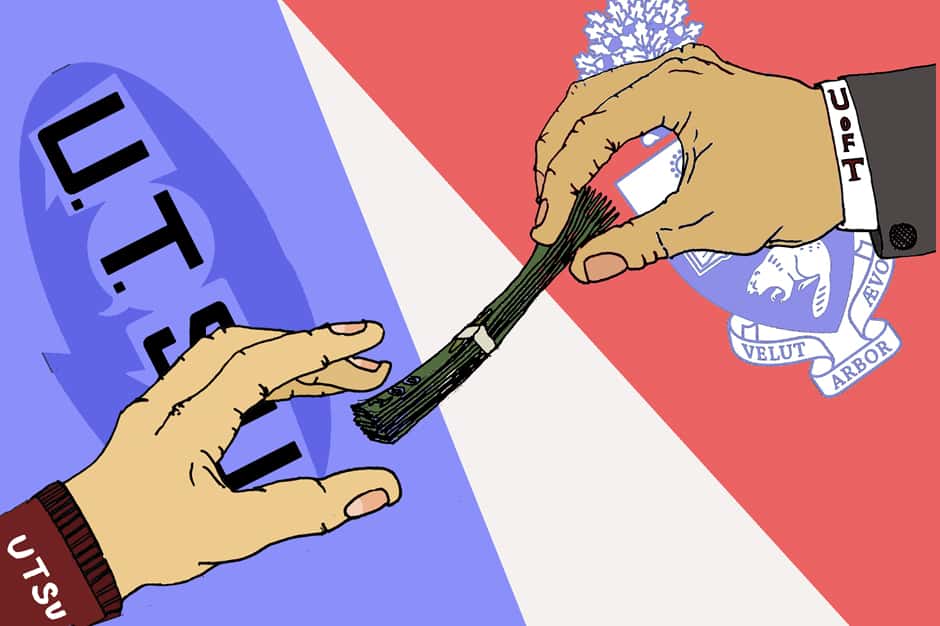Pressure on the University of Toronto Students’ Union (UTSU) is heating up ahead of its Annual General Meeting (AGM).
At the close of elections last March, the new executive committee faced unresolved grievances, divisions demanding fee diversion, and the possibility of their own funds being withheld by university administration. Already, there have been changes in a bid to address these controversies, including several amendments to the Elections Procedure Code (EPC) passed at board meetings last week. One such motion effectively allows the Elections and Referenda Committee to override UTSU bylaws in the interests of upholding the spirit and principle of the election.
Outstanding grievances
Vipulan Vigneswaran, former campaign manager for Team Unite, filed grievances surrounding the five extra hours of voting at UTM in response to the closure of the campus due to inclement weather. Vigneswaran said that the extension of voting time at UTM was illegal because it was not set up under the EPC or the UTSU’s bylaws. “They’re saying they were compensating for voting hours lost. Sure, but you also had online voting,” Vigneswaran said.
Vigneswaran also took issue with the inclusion of Luis Moreno’s name on the paper ballot for vice-president, external. Moreno dropped out of the election prior to voting, giving Team Unite an explicit endorsement on his way out. Votes for Moreno were counted as spoiled ballots.
Vigneswaran said that he was confident that Team Unite’s candidates would have won their elections for vice-president, external and vice-president, internal were it not for the fourth day of voting and the inclusion of Moreno’s name on the ballot. “It’s completely changed the way everything played out,” Vigneswaran said.
Vigneswaran also said that the UTSU failed to comply with the university’s Policy for Compulsory Non-Academic Incidental Fees, which governs the collection and release of funds for student societies. Vigneswaran does not think that the UTSU behaved in an “open, accessible and democratic” manner — elements that are mandatory under the policy in order for the UTSU to receive its funds.
Althea Blackburn-Evans, U of T director of media relations, said that the definition of “open, accessible and democratic” is cloudy, despite being discussed at last year’s Student Societies Summit. Blackburn-Evans declined to confirm or deny that the UTSU has received or would receive its funds, instead citing a clause in the policy, which states that student society fees can be withheld after a society’s own complaint procedure has been exhausted and if there is reason to believe significant constitutional or procedural irregularities exist. Blackburn-Evans said that the Administrative Response to the Student Societies Report, which deals with issues of democracy in student societies, will be forthcoming shortly from the provost to Governing Council.
“At this point, all grievances have already gone through the UTSU’s internal processes. The election results were approved by the Board of Directors and subsequent grievances were defeated near unanimously,” said Yolen Bollo-Kamara, UTSU president.
“We hope this will clarify the purpose of the Code and minimize complaints stemming from perceived technical violations,” she added. However, according to Blackburn-Evans, the university has not yet concluded its investigation into the election complaint it received last year. Blackburn-Evans said that the university will be in touch with the relevant parties upon the conclusion of the investigation.
Platform promises progress
Since the completion of the grievance process, the UTSU has begun work on its election promises, which include campaigns to lower tuition fees, lobby the government with regard to unpaid internships, and implement a drop credit policy. A drop credit policy would allow students to remove one or two bad marks from their transcript that may have been caused by extenuating circumstances.
According to Bollo-Kamara, Grayce Slobodian, UTSU vice-president, external, is working to bring back the Drop Fees campaign and is organizing a rally to be held during second semester. “We are looking forward to engaging students in this campaign and mobilizing them to take action on issues specific to U of T such as flat fees and unfair ancillary fees, in addition to broader issues such as the dearth of provincial funding for post-secondary institutions in Ontario,” said Bollo-Kamara.
For her part, Najiba Ali Sardar, UTSU vice-president, equity, has been involved in unpaid internship activism and is prepared to launch a large-scale campaign. “This issue is extremely important to me and I have been committed to it as I have been much before my involvement in student politics,” Sardar said.
Sardar and Bollo-Kamara both spoke at Parliament’s Finance Committee in Ottawa, a report of which was entitled “Youth Employment in Canada: Challenges and Potential Solutions.” Bollo-Kamara said that several of the measures she advocated are recommended in the report, including increased protection of interns under relevant legislation at federal, provincial, and territorial levels, and gathering data on unpaid internships and precarious work among youth.


